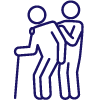- Yokohama-shi Top Page
- Hodogaya Ward Top Page
- Health, Medical Care and Welfare
- Health and Medical Care
- Health promotion
- Healthy trivia
- Health trivia "between specific medical examination"
Here's the text.
Health trivia "between specific medical examination"
This is a health trivia related to specific medical examinations. "trivia" is "miscellaneous matters, knowledge, and trivia." The information provided here is supervised by Health and Welfare Center Hodogaya, referring to information from public institutions such as the Ministry of Health, Labour and Welfare.
Last Updated September 30, 2020
Click here for health trivia related to specific medical examinations
1 Is it true that "HbA1c, which shows the state of blood sugar even if you save your meal just before a medical checkup, does not change much?" ?
2 When measuring blood pressure at home, is it really within one hour after getting up in the morning? ?
3 Should I be aware that my blood pressure measured when I woke up in the morning is high? ?
4 People who have increased by 5 kg or more from the age of 20 actually have about 2.6 times the risk of diabetes compared to those who did not change? ?
1 Is it true that "HbA1c, which shows the state of blood sugar even if you save your meal just before a medical checkup, does not change much?" ?
It's true.
HbA1c (hemoglobin A1C) is a combination of blood glucose (hemoglobin (Hb)) in red blood cells and blood sugar (glucose) in the blood. Once connected, blood glucose continues to bind until the life of red blood cells is exhausted (about 120 days) until the life of red blood cells.
Therefore, HbA1c can tell you the status of blood sugar in the past 1-3 months.
In other words, even if you save one or two meals, the value of HbA1c does not change significantly.
In general, taking in a lot of glucose into the body increases blood sugar and HbA1c.
Increasing blood sugar and HbA1c increase the risk of diseases such as cerebral infarction and myocardial infarction as well as diabetes.
It is a very important index to review your diet, so check your own HbA1c value.
2 When measuring blood pressure at home, is it really within one hour after getting up in the morning? ?
It's true.
Blood pressure fluctuates during the day. For example, blood pressure is generally low when sleeping at night, and blood pressure increases as you wake up in the morning.
In addition, blood pressure fluctuates with daily small things such as changing positions (getting up, sitting, etc.), talking, and eating.
It is recommended to know your normal condition when blood pressure fluctuation is low.
[Recommended time zone]
●Within one hour after waking up in the morning (before taking medicine before meals before meals)
●Before going to bed at night (after urination more than 1 hour after meal. If you take a bath, do not take an hour.)
※Let's avoid it because blood pressure rises immediately after meals.
3 Should I be aware that my blood pressure measured when I woke up in the morning is high? ?
It's true.
Blood pressure is generally low when sleeping at night, and blood pressure increases as you wake up in the morning.
For early morning high blood pressure, measured values measured at home within one hour after getting up are diagnosed based on the following conditions.
The upper blood pressure (systolic blood pressure) is 135 mmHg or more.
Or
Low blood pressure (diastolic blood pressure) is 85 mmHg or more
In particular, myocardial infarction and cerebrovascular disease often occur early in the morning and require caution.
The causes vary, but it is a sign that you need to review your lifestyle, so don't miss it.
[Example of Cause]
●Lack of sleep and poor quality sleep ●Stress ●Excessive drinking (to reduce sleep quality and dehydration)
●Smoking ●(If you are treating blood pressure) The blood pressure medication is not effective enough
●Sleep apnea Syndrome ●Diabetes (related to autonomic disorders)
4 People who have increased by 5 kg or more from the age of 20 actually have about 2.6 times the risk of diabetes compared to those who did not change? ?
It's true.
In multi-purpose cohort study (JPHC study), those who have increased by 5 kg or more compared to their weight at the age of 20 increased the risk of diabetes by 2.61 times for men and 2.56 times in women compared to those who do not.
Among women, those who increased weight by 5 kg or more in middle age had a 1.8 times higher risk of developing diabetes compared to those with less change (less than 2.5 kg).
To increase weight by 1kg (when most of it is fat), it means that it has been accumulated in the body some form of 7,000kcal.
If you lose weight at a stretch, you may change your physical condition, so let's control your weight by reviewing your daily lifestyle habits!
Regarding weight changes from the age of 20 to the baseline, the subjects were reduced by 15 kg or more, 2 Changes to less than 5 kg 3 Increase by 5 kg or more. Five years later, a survey was conducted to see diabetes, cancer, and cardiovascular disease. Men and women aged 40 to 69 years old were confirmed five years later, and a survey was conducted to see the association with the onset of diabetes.
As a result, the group with weight gain of 5 kg or more, the risk of diabetes was 2.6 times higher than the unchanged army.
Reference Ministry of Health, Labour and Welfare Standard Questionnaire
https://www.mhlw.go.jp/seisakunitsuite/bunya/kenkou_iryou/kenkou/seikatsu/dl/hoken-program2_02.pdf (external site)
Please take a look at this page.
For inquiries to this page
Hodogaya Ward Health and Welfare Division Health Promotion Section
Phone: 045‐334‐6344
Phone: 045‐334‐6344
Fax: 045‐333-6309
Email address: ho-kenkou@city.yokohama.jp
Page ID: 781-876-644













